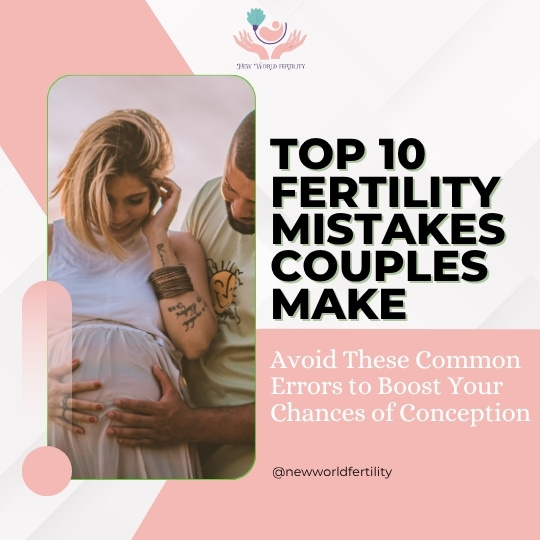Introduction:
Conceiving a baby may seem natural, but for many couples, it can become a journey full of questions and silent frustration. According to top fertility specialists, many couples unknowingly make certain fertility mistakes that lower their chances of success.
In this blog, we uncover the top 10 common fertility mistakes couples make and offer expert-backed advice to help you boost your chances of conception.
???? Expert Tip: If you're trying for over 6–12 months without success, consult a fertility expert early. Timely guidance can make all the difference.
1. Misunderstanding the Fertile Window
Timing is everything. Many couples believe any time is the right time — but ovulation happens only once per cycle.
???? Fix: Track ovulation through apps, basal body temperature, or ovulation prediction kits. The most fertile window is 2 days before and the day of ovulation.
2. Over-Stressing and Under-Relaxing
Chronic stress can alter hormone levels like cortisol, directly impacting ovulation and sperm quality.
????♀️ Fix: Incorporate yoga, mindfulness, or light exercise into your routine. Balance is key when trying to conceive.
3. Ignoring Male Fertility Health
Fertility isn't just a female issue. Male infertility accounts for nearly 40–50% of cases.
???? Fix: Men should undergo a semen analysis and avoid smoking, alcohol, and tight clothing to support healthy sperm production.
4. Waiting Too Long to Seek Help
Delaying medical advice can lower fertility chances, especially for women above 35.
???? Fix: If under 35 and TTC for 12 months (or 6 months if 35+), consult a fertility specialist.
5. Poor Diet and Lack of Nutrients
Deficiency in essential nutrients like folic acid, zinc, vitamin D, and iron can harm reproductive health.
???? Fix: Follow a fertility-boosting diet rich in greens, seeds, fruits, and healthy fats. Consider supplements if prescribed.
6. Smoking, Alcohol, and Caffeine Overload
These substances reduce egg and sperm quality and increase miscarriage risk.
???? Fix: Quit smoking, reduce alcohol, and limit caffeine to under 200 mg/day.
7. Too Much or Too Little Exercise
While fitness helps, extreme exercise or being underweight can disrupt ovulation.
????♀️ Fix: Aim for moderate exercise 3–5 days a week. Balance is essential.
8. Relying Too Much on Dr. Google
Self-diagnosing through online content can delay necessary treatments or cause unnecessary stress.
???? Fix: Use reliable sources, but always confirm with certified fertility specialists.
9. Using Lubricants That Harm Sperm
Many over-the-counter lubricants are not sperm-friendly and may reduce motility.
???? Fix: Use fertility-friendly lubricants like Pre-Seed, which mimic natural cervical mucus.
10. Not Getting Basic Fertility Tests Done
Ignoring fertility testing can leave you in the dark about hormonal imbalances, PCOS, endometriosis, or low sperm count.
???? Fix: Simple tests like AMH, AFC, semen analysis, and hormonal panels can reveal hidden issues.
What to Do If You’ve Made These Mistakes?
Don’t panic. Most of these issues are reversible with awareness, support, and expert intervention. Make small lifestyle changes and seek early diagnosis.
Read More: Essential Tests Before IVF: A Complete Guide to Fertility Evaluations & Success Preparation
When to Visit a Fertility Expert?
If you're:
-
Under 35 and TTC for over 12 months
-
Over 35 and TTC for over 6 months
-
Have irregular periods, PCOS, or thyroid issues
-
Had multiple miscarriages
???? Then, it’s time to visit a fertility specialist.
At New World Fertility, we offer customized fertility care, advanced testing, and emotional support — all under one roof.
???? FAQs:
Q1. How do I know if I'm making a fertility mistake?
You may not realize it, but signs like delayed periods, stress, lifestyle imbalance, or no conception after months of trying could be indicators.
Q2. Can these mistakes cause infertility permanently?
Most are correctable with timely intervention. However, ignoring them for too long can reduce fertility potential.
Q3. How can I improve my fertility naturally?
Eat a nutrient-rich diet, track ovulation, reduce stress, exercise moderately, and eliminate toxins like alcohol or tobacco.
Q4. Is age still the biggest fertility factor?
Yes. Female fertility starts declining at 30 and dips faster after 35. Male fertility also declines gradually.

 Jul-09-2025
Jul-09-2025